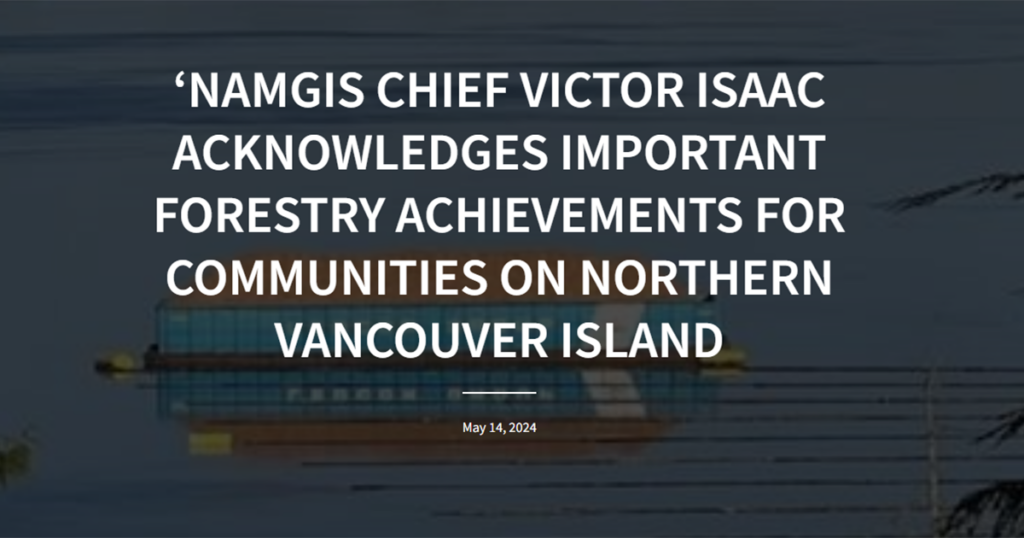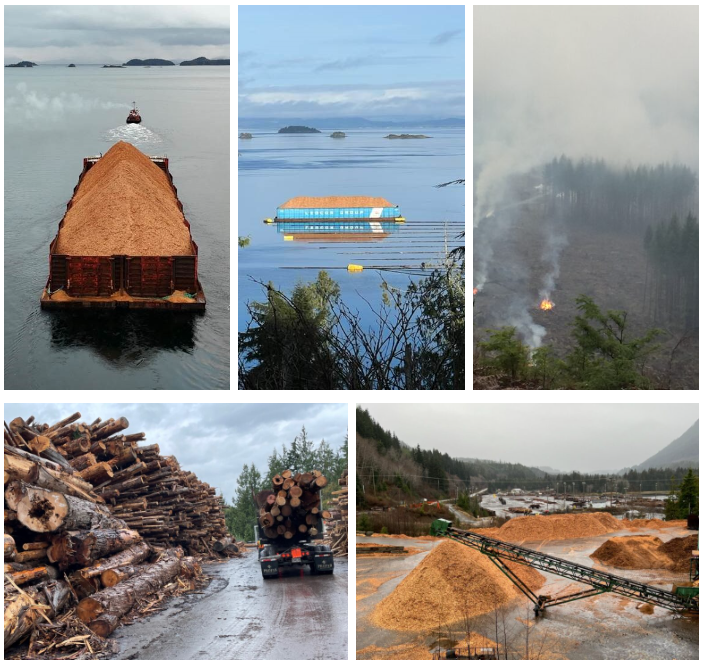May 15, 2024 (press release) –
May 14, 2024

Below is a quote from our Chief Forester, Quinton Hayward, followed by a recent article published by the Forest Enhancement Society of BC celebrating an important sustainable forestry practices milestone achieved by Atli Resources LP. You can also find the article on FESBC’s website: ‘Namgis Chief Victor Isaac Acknowledges Important Forestry Achievements for Communities on Northern Vancouver Island – FESBC – Forest Enhancement Society of BC
“Paper Excellence is proud to be a part of the Atli Chip Limited Partnership. As a company, we understand the importance of being good neighbors and greatly value our relationships with Indigenous communities and their business ventures. FESBC funding has been critical in helping source fibre for the chip plant and keep it operating at a time when the industry is struggling and sawmills are shut down or curtailed due to low harvesting activity. This slowdown of harvesting activity has greatly impacted the flow of pulplogs to the Atli Chip plant and threatened its viability. FESBC funding has helped keep fibre flowing, ensuring continued employment at the plant and production of chips for Paper Excellences coastal facilities. ” – Quinton Hayward, Chief Forester for Paper Excellence and an Atli Chip Board Member.
Port McNeill, Alert Bay and Surrounding Communities, B.C. – Atli Resources LP, a ‘Namgis First Nation-owned company, in collaboration with the Forest Enhancement Society of BC (FESBC), is celebrating an important milestone in sustainable forestry practices with the successful recovery of 35,000 cubic meters of fibre—equivalent to approximately 700 truck loads. This achievement has been made possible through the crucial support and funding provided by FESBC, highlighting the impactful role FESBC plays in supporting projects that lead to substantial environmental benefits and community development.
As a part of the projects funded by FESBC, waste fibre is being collected and chipped at the Atli Chip facility at Beaver Cove. The fibre comes from areas outside the economic radius of the plant, including areas near Holberg, Port Alice, Woss, and Port McNeill. The chipped fibre is then transported to support the operations of Paper Excellence’s pulp mills in Howe Sound and Crofton.
Chief Victor Isaac of the ‘Namgis First Nation reflected on the projects’ profound cultural and environmental impact and said, “For generations, our connection to the forest has been fundamental, from the cedar bark used in our traditions and day-to-day life to the trees that support our existence. These forests are not just resources—they are vital to our cultural identity and way of life. FESBC’s funding has been crucial in maintaining this. It’s allowed us to integrate sustainable management practices that respect our heritage while ensuring the forests remain vibrant and productive for future generations. This project doesn’t just benefit us economically through job creation—it helps maintain the health of our lands, which is priceless.”

The two projects on North Vancouver Island, supported through FESBC funding, are confronting the logistical and operational challenges in salvaging and transporting fibre, particularly from remote or hard-to-reach areas and are successfully managing to transport the waste fibre instead of piling and burning it.
“Forests are at the heart of our identity in B.C., and we are all responsible for ensuring their future,” said Bruce Ralston, Minister of Forests. “As we work to support a strong and sustainable forest sector, FESBC has played a pivotal role in helping get more fibre that would have previously gone to waste into the hands of mills across B.C. to be processed into usable products. These initiatives help get more value out of every tree and lower greenhouse gas emissions, all while supporting the hard-working people and businesses that make up our forestry sector.”
Confirming Minister Ralston’s remarks, the project is already showcasing the tangible outcomes of such initiatives. This project effectively recovered 35,000 cubic meters of waste fibre (equivalent to 15,493 CO2 emissions if burned, further equivalent to 3,300 cars off the road for a year), including low-value logs and short pieces of wood typically left to pile and burn or rot. This reduces potential wildfire fuel and significantly cuts down on greenhouse gas emissions, plus smoke and ash.
Doug Mosher, CEO of Atli Resources, said, “The involvement, advice, assistance, and funding from FESBC has made an incredible contribution to the fibre supply for the chip plant. With FESBC funding, Atli Resources and its contractor have been able to salvage fibre that otherwise would be well beyond the chip plant’s economic range to transport it economically. This also has enhanced primary and secondary employment and other benefits to the environment and local economy.”
The benefits, as Mosher notes, extend beyond the immediate environmental impact. The operation of the chip plant and related salvaging activities has created 25 to 30 full-time ongoing jobs, providing stable employment and boosting the local economy. The influx of workers has led to increased demand for local services such as housing, food, and retail and has prompted contractors to invest in new equipment to handle the increased workload. Moreover, the project has helped more efficient forest regeneration by clearing the way for new seedlings, thus enhancing the sustainability of forest management practices.
Kurt Leroy, operations manager with Estero Peak Contracting Ltd., explained, “The help and the funding from the FESBC program has made it financially viable for Estero Peak Contracting Ltd. to salvage and haul logs from outside the usual Fibre Recovery Zone (distance wise). They have, therefore, been able to provide more jobs for members of the local communities at the north end of Vancouver Island.”
Beyond the multiple benefits this project has provided the ‘Namgis and the community, it has brought together several local companies, creating strong partnerships that boost both the economy and the environment. A critical contributor to the success of the project is Atli Chip LP. Atli Chip is jointly owned by Atli Resources, along with the local logging company Wahkash Contracting Ltd, and Paper Excellence, a pulp and paper company. Estero Peak Contracting Ltd, a local contractor, takes care of fibre salvaging, loading, and hauling the waste wood, and supporters like Western Forest Products and Mosaic Forest Management provide access to cutblocks for salvaging fibre. Paper Excellence purchases the pulp logs for the chip plant from forest licensees and various landowners and then purchases the residual chips and hog fuel (bark and small pieces of wood) from Atli Chip LP. This teamwork shows how working together can lead to major achievements in sustainable forestry.
Chris McGourlick, operations manager with FESBC, said, “Atli Chip LP is an excellent example of a First Nations-led partnership achieving multiple environmental, social and economic benefits. Removingresidual fibre and the corresponding reduction in burning activities contributes to a healthier local environment and additional economic activities. As we see harvest levels decrease across the province, partnerships like this are critical to providing stability to communities and local economies. The leadership that the Namgis are showing through Atli Resources and Atli Chip is highlighting ways to move forward as forest stewardship evolves in the province. FESBC is proud to partner with them as they work to improve the utilization of our forest resources.”
Looking ahead, Atli Resources remains committed to expanding its environmental and economic impacts through sustainable forestry practices. The company continuously seeks available fibre for chipping and plans to increase the operational capacity of the chip plant to double shifts whenever sufficient fibre is available. This will maximize productivity and the project’s environmental benefits.
According to Mosher, the waste wood salvaging projects are also set to continue, especially for the long-distance areas outside of the Ministry of Forests-derived Fibre Recovery Zones, relying on the ongoing support from FESBC funding. This sustained effort will ensure that less fibre goes to waste, helping to reduce greenhouse gas emissions and better protect communities from wildfire risk.
These comprehensive efforts further showcase the critical role of FESBC-funded projects in preserving the environment and strengthening the economic fabric of communities throughout B.C.
* All content is copyrighted by Industry Intelligence, or the original respective author or source. You may not recirculate, redistribute or publish the analysis and presentation included in the service without Industry Intelligence's prior written consent. Please review our terms of use.